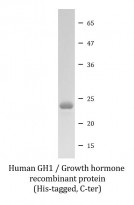ARG70232
Human GH1 / Growth hormone recombinant protein (His-tagged, C-ter)
Human GH1 / Growth hormone recombinant protein (His-tagged, C-ter) for Binding Activity,SDS-PAGE and Human
Overview
| Product Description | E. coli expressed, His-tagged (C-ter) Human GH1 / Growth hormone recombinant protein. |
|---|---|
| Tested Reactivity | Hu |
| Tested Application | Binding, SDS-PAGE |
| Target Name | GH1 / Growth hormone |
| Species | Human |
| A.A. Sequence | Phe27 - Phe217 of Human GH1 / Growth hormone (NP_000506.2) with an initial Met at the N - terminus and 6X His tag at the C - terminus. |
| Expression System | E. coli |
| Alternate Names | GH-N; Somatotropin; IGHD1B; Growth hormone; Growth hormone 1; Pituitary growth hormone; GHN; hGH-N; GH |
Application Instructions
| Application Note | Binding activity test: Measured by its binding ability in a functional ELISA. Immobilized Recombinant Human GH at 2 µg/ml (100 µl/well) can bind Recombinant Human GHR with a linear range of 3-12 ng/ml. |
|---|
Properties
| Form | Powder |
|---|---|
| Purification Note | 0.22 µm filter sterilized. Endotoxin level is <0.1 EU/µg of the protein, as determined by the LAL test. |
| Purity | > 92% (by SDS-PAGE) |
| Buffer | 20 mM Tris (pH 8.0) and 150 mM NaCl. |
| Reconstitution | Reconstitute to a concentration of 0.1 - 0.5 mg/ml in sterile distilled water. |
| Storage Instruction | For long term, lyophilized protein should be stored at -20°C or -80°C. After reconstitution, aliquot and store at -20°C for up to one month, at 2-8°C for up to one week. Storage in frost free freezers is not recommended. Avoid repeated freeze/thaw cycles. Suggest spin the vial prior to opening. |
| Note | For laboratory research only, not for drug, diagnostic or other use. |
Bioinformation
| Gene Symbol | GH1 |
|---|---|
| Gene Full Name | growth hormone 1 |
| Background | The protein encoded by this gene is a member of the somatotropin/prolactin family of hormones which play an important role in growth control. The gene, along with four other related genes, is located at the growth hormone locus on chromosome 17 where they are interspersed in the same transcriptional orientation; an arrangement which is thought to have evolved by a series of gene duplications. The five genes share a remarkably high degree of sequence identity. Alternative splicing generates additional isoforms of each of the five growth hormones, leading to further diversity and potential for specialization. This particular family member is expressed in the pituitary but not in placental tissue as is the case for the other four genes in the growth hormone locus. Mutations in or deletions of the gene lead to growth hormone deficiency and short stature. [provided by RefSeq, Jul 2008] |
| Function | Plays an important role in growth control. Its major role in stimulating body growth is to stimulate the liver and other tissues to secrete IGF-1. It stimulates both the differentiation and proliferation of myoblasts. It also stimulates amino acid uptake and protein synthesis in muscle and other tissues. [UniProt] |
| Cellular Localization | Secreted. [UniProt] |
| Calculated MW | 25 kDa |
Images (1) Click the Picture to Zoom In






